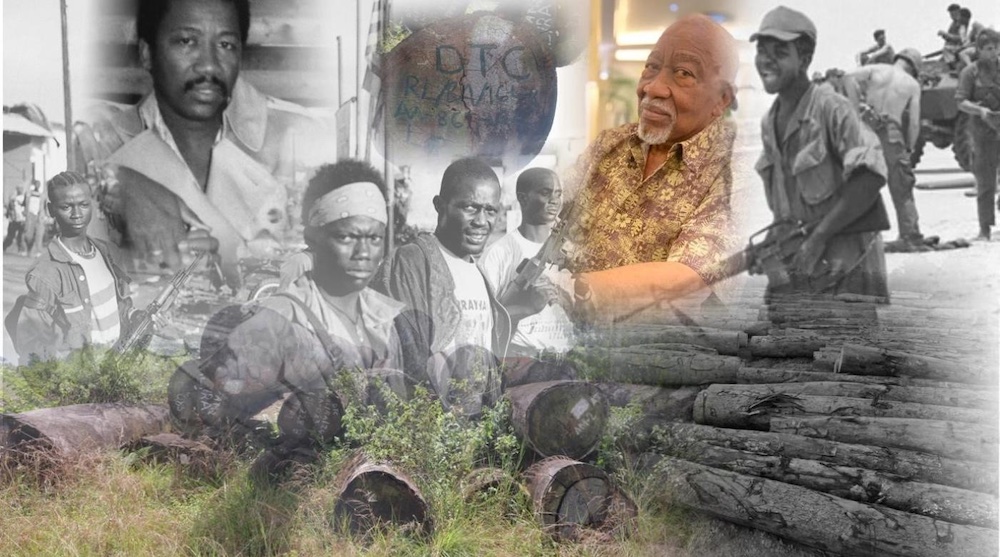
By Emmanuel Sherman and James Harding Giahyue, with The DayLight
In 2016, Numopoh Community Forest leased 7,220 hectares of forestland to Delta Timber Company.
Instead of the forest in Sinoe’s Kpanyan District, Delta harvested logs in another area of the woodland, an investigation by an NGO found two years later. It abandoned logs in the forest and at the Ross Port of Greenville, Sinoe County. Then it failed to live up to the agreement with Numopoh.
But all of this would not have happened had the Forestry Development Authority (FDA) disapproved the agreement. The involvement of Gabriel Doe, Delta’s owner, in the logging industry before and during Liberia’s bloody civil wars means he should not participate in forestry.
Doe owned the Cavalla Timber Corporation, one of 17 logging companies that either supported militias, participated in, or facilitated the war. An estimated 250,000 people died during the carnage and about a million were displaced.
“Logging revenue was unlawfully used by political elites and warring factions to fund armed conflict[s],” said the Truth and Reconciliation Commission (TRC). “Logging companies shipped or facilitated shipments of weapons and other military materials to warring factions.”
Cavalla had an affiliation with the notorious Oriental Timber Company (OTC), owned by convicted war criminal Guus Kowenhoven, who traded illegal Liberian timbers and supplied guns to then-President Charles Taylor.
In 2001, the United Nations imposed a travel ban and assets freeze on Doe, Taylor, Kowenhoven and more than 100 other individuals linked to the Taylor regime, which took over a decade to be lifted. Two years after the travel ban, the United Nations sanctioned Liberian logs. The sanctions were intended to break the connection between the individuals and Liberia’s natural resources, and arms smuggling, the UN said at the time.
Gabriel Doe illegally obtained a logging contract though he and other wartime loggers are debarred from participating in forestry, according to the Regulation on Bidders Qualification. Picture Credit: Facebook/Gabriel Doe Doe
Following a rigorous reform process, the UN lifted the sanctions on Liberian timber in 2006. The Liberian government canceled the contracts of Cavalla and other companies over irregularities as part of the reform.
But to prevent future “blood timber,” “conflict timber” or “logs of war,” the reform agenda partially debars wartime loggers from the ravaged industry. It empowered local communities to enter into contracts and benefit from their forests.
The logging industry fueled the two Liberian civil wars, according to the Truth and Reconciliation Commission (TRC). Picture credit: Teun Voeten
An Illegal Re-entry
Apparently inspired by Cavalla, his old company, Doe established Delta in 2012. He holds 60 percent of Delta’s shares, with the rest outstanding, according to its article of incorporation.
Doe did not only have a relationship with former President Charles Taylor. He might have also allied with former President Ellen Johnson Sirleaf, who led the country when Delta was established. In her 2009 memoir, This Child Will Be Great, Mrs. Sirleaf claimed she secretly boarded Doe’s airplane to escape from late President Samuel K. Doe (No relation to Gabriel Doe). Gabriel Doe denies that story.
With his paperwork in hand, Gabriel Doe headed to Sinoe’s Kpanyan District, a region in which he had worked many years ago. He had begun his logging career in Nimba in the early 1970s with another company, he told The DayLight in an interview in Monrovia. Cavalla had also worked in the southeastern region in the 1980s up to the early 2000s.
Villagers knew Doe’s past but he assured them it was a new beginning, Sam Kainde, the head of Numopoh’s leadership, told The DayLight.
“He told our people at this time that there is [National Forestry Reform Law] and [Community Rights Law of 2009 with Respect to Forest Land] that [are] going to [protect] the community so, what they used to do had passed,” Kainde said. “Our people grasped it in their minds.”
But it was the beginning of the community’s postwar nightmare.
In December 2018, just two years into the agreement, Volunteer to Support International Effort Developing Africa (VOSIEDA), an NGO, found the company harvested 500 logs outside its contract area. VOSIEDA’s report referenced an investigation by Global Witness in 2017, which captured the illegal felling and other accusations.
The FDA did not punish the company. Per the Regulation on Confiscated Logs, Timber and Timber Products, the FDA should have obtained a search warrant, confiscated the logs in question and auctioned them. It should have fined Delta two times the official price of the logs, a six-month prison term or both, according to the regulation. The FDA did not respond to The DayLight’s queries for this story.
Delta paid Numopoh just under US$1,000 for the illegal harvesting and US$4,963.75 for a one-year land rental fee, according to a receipt of the payment. It owes nearly US$20,000 in land rental and harvesting fees, based on the receipt and the agreement.
Delta has also failed to complete a school, establish a sawmill, and erect a clinic. It has not funded Numopoh’s scholarship program in line with the agreement.
In fact, in all, Delta has only paved a 26-kilometer dirt road.
Delta is one of the most dormant, failing to renew its business registration since June 2021, records at the Liberia Business Registry show.
Delta has abandoned nearly all of the logs it harvested, another violation. Between 2018 and 2021, it produced 1,624.521 cubic meters of logs. However, it only managed to export 237.178 cubic meters or just 41 logs, according to the LEITI, citing company and FDA figures. Some of the logs have rotted at the Port of Greenville, others are scattered in the Numopoh forest.
Doe wrongly claims that the logs are not abandoned.
“They were not abandoned,” Doe told The DayLight. “If you decide to operate in the port, you request for an area and you stockpile the logs until the vessel comes in.”
Doe’s claims are not backed by facts. Under the Regulation on Abandoned Logs, Timber and Timber Products, logs cannot stay more than one-and-a-half months at a port. The regulation came a year after the Numopoh-Delta agreement to curtail the waste of timber but has not been enforced.
Numopoh and DELTA might have acted illegally by signing an agreement. However, the FDA broke its own law by approving it. The Regulation on Bidder Qualifications requires the FDA to disqualify businesspeople connected to the logging industry before 2006 unless they fully and honestly confess their deeds to the TRC.
Doe claims he received a certificate from the TRC after he appeared. “If I didn’t comply, [the] FDA would not have permitted me to do logging…,” Doe told The DayLight.
Proving or disproving Doe’s appearance is difficult, as he is not mentioned in the TRC report and most of the commission’s archives remain sealed until 2029. However, journalists who covered the commission and former commissioners, communication staffers and data clerks deny Doe’s claim.
But appearing before the TRC is not the only condition for wartime loggers to participate in forestry today. The qualification regulation requires wartime loggers to restitute funds that the government lost as a result of their illegalities. Interestingly, they must pledge they would not repeat their illegal dealings. There is no record that Doe did so.
The TRC aside, the FDA has illegally approved a number of contracts for companies whose owners are ineligible. For instance, it approved a contract for a company owned by Deputy Foreign Minister Comfort Thelma Duncan Sawyer, one owned by a rogue company owner and another by the then-Minister of Posts and Telecommunications Cllr. Cooper Kruah.
Harrison Karnwea, the Managing Director of the FDA at the time — who approved DELTA’s contract — did not say whether or not Doe appeared before the TRC. Rather, he justified having approved the wartime logger’s contract.
Karnwea suggested he could not be held responsible for the Delta situation. He claims that the FDA is not required by law to have a list of debarred people and companies and that the FDA only witnesses contracts.
“The communities award their contracts to somebody and take the person to the FDA for the FDA to witness the agreement and acknowledge it,” said Karnwea, the current chairman of the agency’s board of directors.
Several logs Delta Timber Company left at the Port of Greenville, Sinoe County that have now decayed. The DayLight/James Harding Giahyue
“There is no such thing as [a] debarment list,” he added.
Karnwea’s claims are not based on the facts. The qualification regulation mandates the FDA to keep a list of debarred persons in addition to a list the Public Procurement and Concession Committee (PPCC) should make.
The National Forestry Reform Law requires the FDA to make sure that companies generally meet the threshold to conduct logging in Libera. Issues include individuals’ financial and technical capabilities, human rights and criminal records, integrity and government affiliation.
Contrary to Karnwea’s claim, the FDA does not witness community forest contracts. It approves — and can disapprove — them, based on the qualification regulation.
Karnwea’s apparent excuse that it was not his responsibility to prequalify companies does not hold. “The Managing Director shall be professionally qualified in forestry,” the act that established the FDA says. “He shall be responsible for the conduct of the general operation of the Authority…”
Termination
Following those years of rigmarole, Numopoh is seeking an end to the contract with Delta. Kainde accuses Doe, who has been away in the Ivory Coast, of holding the forest hostage.
“Given the fact that the agreement has ended and the company has failed to fulfill its financial obligations, the community has decided that it will not renew its agreement with Delta,” Kainde wrote to the FDA in July. “The FDA should therefore not engage in any dealing with Delta regarding the Numopoh [agreement].”
The community’s action is not lawful. To end their relationship with Delta, locals will have to go through an arbitration process, according to the agreement. The arbitration panel comprises three persons, one each from the disputed parties and a third from the FDA.
Doe wants to continue with the agreement despite being indebted to the community.
Kainde told The DayLight Numopoh already engaged an attorney.
“We will seek legal advice for the way forward if FDA does not give us the authorization,” said Kainde.















